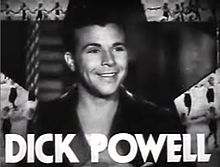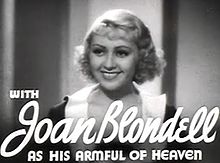- Dick Powell
-
Dick Powell 
from the trailer for
The Bad and the Beautiful (1952)Born Richard Ewing Powell
November 14, 1904
Mountain View, Arkansas, U.S.Died January 2, 1963 (aged 58)
West Los Angeles, California, U.S.Occupation Actor, singer, producer, director Years active 1932–63 Spouse Mildred Maund (1925-27)
Joan Blondell (1936-44)
June Allyson (1945-63)Richard Ewing "Dick" Powell (November 14, 1904 – January 2, 1963) was an American singer, actor, producer, director and studio boss.
Despite the same last name he was not related to William Powell, Eleanor Powell or Jane Powell.
Contents
Biography
Born in Mountain View, the seat of Stone County in northern Arkansas, Powell attended the former Little Rock College in the state capital, before he started his entertainment career as a singer with the Charlie Davis Orchestra, based in the midwest. He recorded a number of records with Davis and on his own, for the Vocalion label in the late 1920s.
Powell moved to Pittsburgh, where he found great local success as the Master of Ceremonies at the Enright Theater and the Stanley Theater. In April 1930, Warner Bros. bought Brunswick Records, which at that time owned Vocalion. Warner Bros. was sufficiently impressed by Powell's singing and stage presence to offer him a film contract in 1932. He made his film debut as a singing bandleader in Blessed Event. He went on to star as a boyish crooner in movie musicals such as 42nd Street, Footlight Parade, Gold Diggers of 1933, Dames, Flirtation Walk, and On the Avenue, often appearing opposite Ruby Keeler and Joan Blondell.
Powell desperately wanted to expand his range but Warner Bros. wouldn't allow him to do so, although they did (mis)cast him in A Midsummer Night's Dream (1935) as Lysander. This was to be Powell's only Shakespearean role and one he did not want to play, feeling that he was completely wrong for the part. Inscrutably, the young actor felt that he was too old to play romantic leading men anymore, and so he lobbied to play the lead in Double Indemnity. He lost out to Fred MacMurray, another Hollywood nice guy. MacMurray’s success, however, fueled Powell’s resolve to pursue projects with greater range.
In 1944, Powell's career changed forever when he was cast in the first of a series of films noir, as private detective Philip Marlowe in Murder, My Sweet, directed by Edward Dmytryk. The film was a big hit, and Powell had successfully reinvented himself as a dramatic actor. He was the first actor to play Marlowe — by name — in motion pictures. (Hollywood had previously adapted some Marlowe novels, but with the lead character changed.) Later, Powell was the first actor to play Marlowe on radio, in 1944 and 1945, and on television, in a 1954 episode of Climax! Powell also played the slightly-less hard-boiled detective Richard Rogue in the radio series "Rogue's Gallery", beginning in 1945.
In 1945, Dmytryk and Powell re-teamed to make the film Cornered, a gripping, post-WWII thriller that helped define the film noir style. He became a popular "tough guy" lead appearing in movies such as Johnny O'Clock and Cry Danger. But 1948 saw him step out of the brutish type when he starred in Pitfall, a film noir that sees a bored insurance company worker fall for an innocent but dangerous femme fatale, played by Lizabeth Scott. Even when he appeared in lighter fare such as The Reformer and the Redhead and Susan Slept Here (1954), he never sang in his later roles. The latter, his final onscreen appearance in a feature film, did include a dance number with costar Debbie Reynolds.
From 1949–1953, Powell played the lead role in the National Broadcasting Company radio theater production Richard Diamond, Private Detective. His character in the 30-minute weekly was a likable private detective with a quick wit. Many episodes ended with Detective Diamond having an excuse to sing a little song to his date, showcasing Powell's vocal abilities. Many of the episodes were written by Blake Edwards. When Richard Diamond came to television in 1957, the lead role was portrayed by David Janssen, who did no singing in the series.
In the 1950s Powell produced and directed several B-movies and was one of the founders of Four Star Television, along with Charles Boyer, David Niven and Ida Lupino. He appeared in and supervised several shows for that company. Powell played the role of Willie Dante in Four Star Playhouse, in episodes entitled "Dante's Inferno" (1952), "The Squeeze" (1953), "The Hard Way" (1953), and "The House Always Wins" (1955). In 1961 Howard Duff, husband of Ida Lupino, assumed the Dante role in a short-lived NBC adventure series Dante, set at a San Francisco nightclub called "Dante's Inferno".
Powell guest-starred in numerous Four Star programs, including a 1958 appearance on the Duff-Lupino sitcom Mr. Adams and Eve. He appeared in 1961 on James Whitmore's legal drama The Law and Mr. Jones on ABC. In the episode "Everybody Versus Timmy Drayton", Powell played a colonel having problems with his son. He hosted and occasionally starred in his Dick Powell's Zane Grey Theater on CBS from 1956–1961, and his final anthology series, The Dick Powell Show on NBC from 1961 through 1963: after his death, the series continued through the end of its second season (as The Dick Powell Theater), with guest hosts.
Powell's film The Enemy Below (1957), based on the novel by Denys Rayner, won an Academy Award for special effects.
Powell also directed The Conqueror (1956), starring John Wayne as Genghis Khan. The exterior scenes were filmed in St. George, Utah, downwind of U.S. above-ground atomic tests. The cast and crew totaled 220, and of that number, 91 had developed some form of cancer by 1981 and 46 had died of cancer by then, including Wayne. This cancer rate is about three times higher than one would expect in a group of this size and many have argued that radioactive fallout was the cause.[1]
Powell himself died from lymphoma at the age of fifty-eight on January 2, 1963, seven years after The Conqueror was made. His body was cremated and his remains were interred in the Columbarium of Honor at Forest Lawn Memorial Park in Glendale, California.
Personal life
Dick Powell was married three times:
- Mildred Maund (1925–1927) — although most biographies say they were divorced in 1927, there are strong indications this is not true. They appear on the 1930 census in Pittsburgh, Pennsylvania, where he is working in a theater, and they appear on a 1931 passenger list where they are returning from Havana, Cuba aboard the SS Oriente.
- actress Joan Blondell (married September 19, 1936, divorced 1944), with whom he had two children, Ellen and adopted son Norman
- actress/singer June Allyson (August 19, 1945, until his death), with whom he had two children, Pamela (adopted) and Richard Powell, Jr.
Powell's ranch-style house in Mandeville Canyon, Los Angeles, was used as the setting for the television show Hart to Hart. Robert Wagner, the actor who portrayed Jonathan Hart in the series, was a close friend of Powell's. Dick Powell also was a major television player with his own production company, Four Star Television, owning several network shows.
Popular culture references
Frank Tashlin's 1937 cartoon The Woods are Full of Cuckoos features an avian caricature of Mr. Powell called "Dick Fowl".
Filmography
As actor
Features
Short subjects
- The Road Is Open Again (1933)
- Just Around the Corner (1933)
- Hollywood on Parade No. A-9 (1933)
- And She Learned About Dames (1934)
- Hollywood Newsreel (1934)
- A Dream Comes True (1935)
- Hollywood Hobbies (1939)
As director
- Split Second (1953)
- The Conqueror (1956)
- You Can't Run Away from It (1956)
- The Enemy Below (1957)
- The Hunters (1958)
Notable recordings
- "Dames"
- "Roses In December"
References
- ^ ^ Olson, James (2002). Bathsheba's Breast: Women, Cancer and History. Baltimore, Maryland: Johns Hopkins University Press. ISBN 080186936
External links
- Dick Powell at the Internet Movie Database
- Dick Powell at the TCM Movie Database
- Dick Powell Photo Gallery
- Dick Powell at Find a Grave
- Dick Powell.net, a Fansite
- Photographs and literature
Films directed by Dick Powell Split Second (1953) · The Conqueror (1956) · You Can't Run Away from It (1956) · The Enemy Below (1957) · The Hunters (1958)
Hosts of the Academy Awards ceremonies (1941–1960) Bob Hope (1941) · None (1942) · Bob Hope (1943) · Jack Benny (1944) · Bob Hope / John Cromwell (1945) · Bob Hope / James Stewart (1946) · Jack Benny (1947) · Dick Powell / Agnes Moorehead (1948) · Robert Montgomery (1949) · Paul Douglas (1950) · Fred Astaire (1951) · Danny Kaye (1952) · Bob Hope / Conrad Nagel (1953) · Donald O'Connor / Fredric March (1954) · Bob Hope / Thelma Ritter (1955) · Jerry Lewis / Claudette Colbert / Joseph L. Mankiewicz (1956) · Jerry Lewis / Celeste Holm (1957) · Bob Hope / David Niven / James Stewart / Jack Lemmon / Rosalind Russell (1958) · Bob Hope / David Niven / Tony Randall / Mort Sahl / Laurence Olivier / Jerry Lewis (1959) · Bob Hope (1960)
Complete list · (1927–1940) · (1941–1960) · (1961–1980) · (1981–2000) · (2001–2020) Categories:- American film actors
- American film producers
- American film directors
- Actors from Arkansas
- American Christian Scientists
- American people of Welsh descent
- People from Stone County, Arkansas
- California Republicans
- Burials at Forest Lawn Memorial Park (Glendale)
- Deaths from lymphoma
- 1904 births
- 1963 deaths
- Bell Records artists
- Cancer deaths in California
- 20th-century actors
Wikimedia Foundation. 2010.


